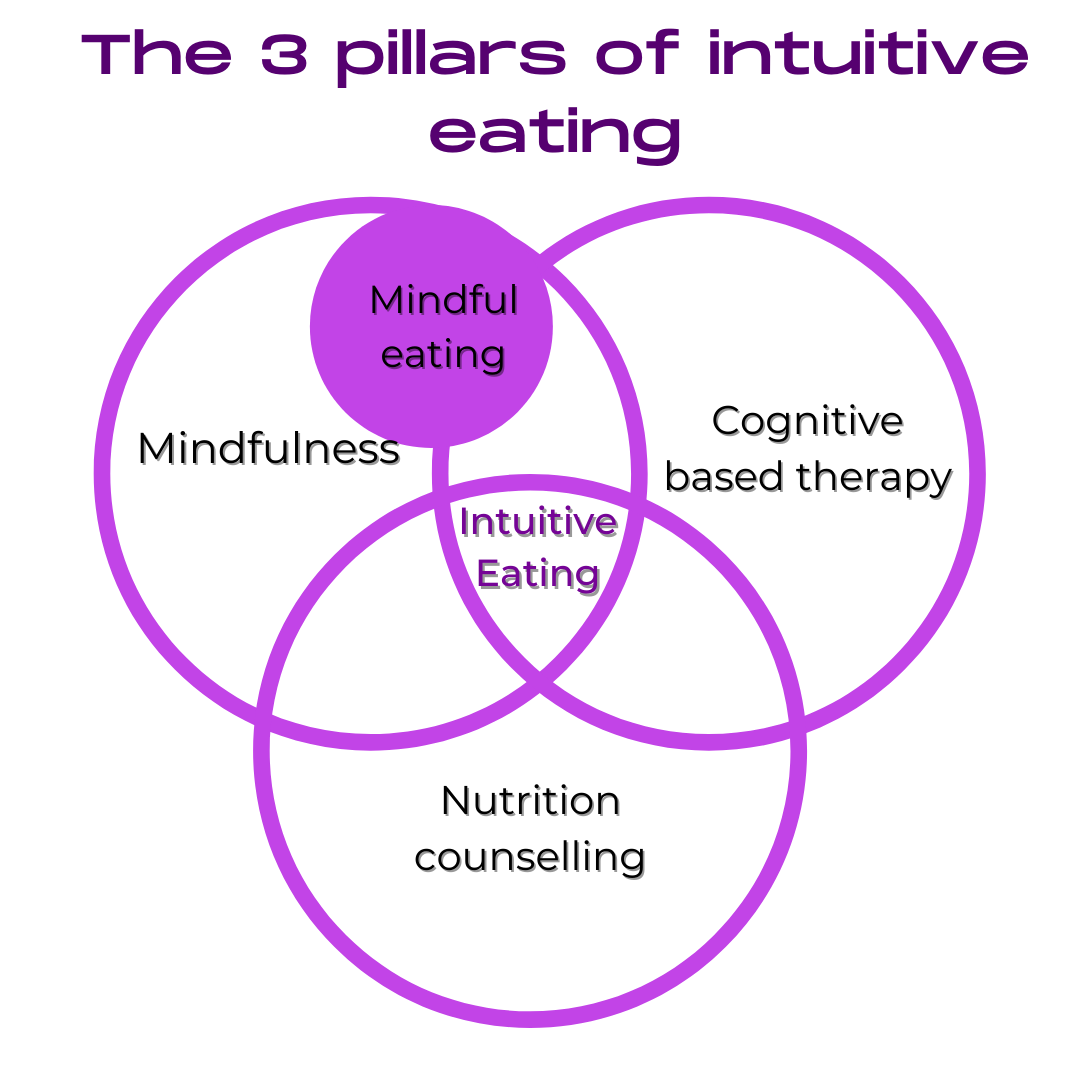Is intuitive eating the same as mindful eating?

Mindful eating is a part of intuitive eating. However the intuitive eating principles go beyond mindful eating alone to incorporate all aspects of the eating experience making it a powerful tool to heal your relationship with food and reduce out-of-control eating experiences such as binge eating. Here's how you can harness intuitive eating to find peace with food.
What is healthy eating?
When we think of healthy eating advice, we usually think of guidance on which foods to eat (and which not to eat), when to eat and how much to eat. This is external knowledge. External because it is coming from the world outside of your own body. This information forms your thoughts and beliefs about food.
Knowledge about food and how your body works can be a very helpful part of healthy eating, but very often the information becomes conflicting, advice becomes rigid and you can begin to feel disconnected with your body and eating.
This external knowledge about foods and bodies makes up only one of three broad parts of the eating experience. When you try to guide your body to eat using only external knowledge, you are ignoring the powerful messages your body is sending you, creating a fight between your body and mind. Eating can become an all-or-nothing experience, with periods of external knowledge guiding you with rules followed by your body fighting back resulting in binge or emotional eating.
This is a sign you need to consider the internal messages your body sends you.
How mindful eating works
Your internal messages make up the two other parts of what guides your eating. Internal messages are the sensations that originate from within your own body and are felt inside your body.
Your organs and tissues have lots of receptors on them to pick up on chemical changes in your body. They take this information and send it to your brain which then decides what response it needs from your body to best support it. The different types of internal information that support your eating include your innate eating cues such as hunger and fullness as well as emotion.
Mindful eating supports you to incorporate these internal sensations that are coming from within your body to help guide your eating. For example, mindful eating can support you to become more attuned to hunger so you know when to eat as well recognise fullness within the body, supporting you to stop eating without relying on an external rule. Mindful eating supports you to tune into the sensory aspects of the eating experience so you can get more pleasure from food.
Mindful eating helps you to develop connection with your body and the internal signals that guide your eating. But what if you have a confusing mix of food rules or experience binge or emotional eating making it difficult to tune in or to trust your body’s messages? This is where intuitive eating fits in.
Intuitive eating is a holistic approach to making peace with food
Before you can allow yourself to trust internal sensations inside your body, you need to gain clarity on how your current beliefs about food are serving you. These beliefs have been formed by outside messages and with such conflicting nutrition information around, you are likely to be holding onto beliefs that are not supporting you to healthy eating.
For example, if you believe a certain food is “bad” it is likely to instil a sense of guilt related to eating it which can interfere with your internal eating messages. You will be unable to engage fully in mindful eating without first removing food guilt and conflicting messages meaning you will still feel a disconnect and experience out-of-control eating.

The 3 pillars of intuitive eating
Cognitive behavioural therapy
Cognitive behavioural therapy (CBT) is a psychological approach that helps to reframe neural pathways in your brain. These neural pathways form your thoughts and beliefs and are strengthened each time you hear supporting information or you have this same thought.
Your thoughts and beliefs are ultimately what influences your behaviour. For example, if you have a belief a certain food is bad, you will try to restrict or eat less of it. Restriction drives increased desire for the food as well as binge eating behaviours. Likewise, if you constantly beat yourself up, your negative thoughts toward yourself will be strengthened, creating hurtful belief pathways about yourself leading to lower confidence and less motivation to care for your body.
Intuitive eating uses CBT to let go of food and body thoughts that are interfering with being able to connect with your body, adopt healthy behaviours and improve your overall confidence and quality of life.
Mindfulness
Once we have let go of some unhelpful beliefs that interfere with our mind-body connection, we can bring in mindfulness based therapy. With intuitive eating, mindfulness goes beyond mindful eating alone. We do incorporate mindful eating to reconnect with our body’s innate cues for hunger, fullness and the sensory aspects of eating but also use mindfulness to explore our emotion, sense of connection and past experiences which all play a role in our eating behaviours.
Mindfulness allows you to reconnect with your body by feeling and trusting the sensations in your body to be your number guide to eating and other self care needs. This part of intuitive eating supports you to stop fighting against your body as you try to eat healthy but rather work with your body to guide your food and other behaviours.
Nutrition counselling
External food knowledge is one part of the eating experience and intuitive eating incorporates outside knowledge about food to support your body’s internal messages so you can make rational decisions about what and when to eat.
Nutrition counselling can play several roles in intuitive eating:
- To provide you with clinical food knowledge to support a medical condition, allergy or intolerance.
- To empower you with knowledge about the biochemical processes that guide your eating and digestion.
- To bust unhelpful food myths and support you with helpful food information that will support healthy eating and a healthy relationship with food.
Nutrition counselling provides you information about food and bodies so you are empowered to use this information along with your internal knowledge to make the decisions that best support you.
Learn how you can improve nutrition using Intuitive Eating with a FREE discovery call with a Registered Dietitian - book here!
Why intuitive eating is preferred over mindful eating alone
The reason intuitive eating is so powerful to healing a difficult relationship with food is that it applies a fully holistic approach by incorporating all aspects of eating. It works, not only on forming connection with your body during the eating experience, but also connection with social and emotional needs as well which play an important role in our food behaviours. Using psychological approaches it also breaks down confusing and conflicting nutrition information and removes guilt and shame around eating.
By connecting to and finding peace with all aspects of the eating experience, you can develop a truly peaceful and easy relationship with food and your body - for life.
Author Bio:
Written by Emma Townsin, Registered Dietitian and Certified Intuitive Eating Counsellor
Emma is the founder of Food Life Freedom and the host of the Food & Life Freedom Podcast. For personalised support to stop stressing over health and heal your relationship with food and your body, learn how you can fast track your way food and life freedom.
Want 1-to 1 support?
Learn how you are supported to feel good around food.








